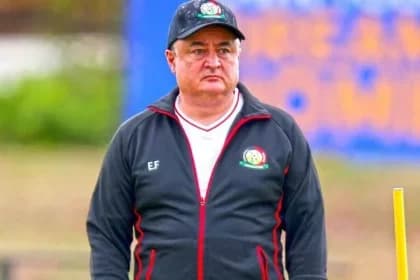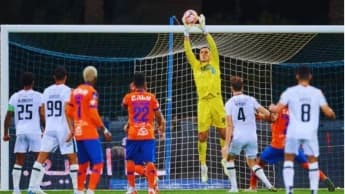Firat's Future in Doubt After Kenya's AFCON Qualification Failure

As uncertainty looms over Harambee Stars' head coach Engin Firat following AFCON qualification failure, the upcoming FKF elections will determine the path forward for Kenyan football amidst calls for reform and leadership change.
The situation regarding the future of Harambee Stars' head coach, Engin Firat, has become more uncertain in light of Kenya's failure to qualify for the 2025 Africa Cup of Nations (AFCON). With the Football Kenya Federation (FKF) elections scheduled for early December, an evaluation of Firat's position as head coach will take place, although speculation about his exit has already increased.
Kenya's aspirations for AFCON qualification were shattered when they ended up in third place in Group J of the qualifiers, a disappointing outcome that placed them behind Cameroon and Zimbabwe, who took the top two positions. Even though they were in a group that appeared to be manageable, Firat's team could secure only one win—against Namibia—and finished with three draws. Two losses to Cameroon, including a demoralizing 4-1 defeat in Yaoundé, underscored the significant disparity in quality between Kenya and the continent's footballing elite.
The inability to secure a spot in AFCON led to widespread criticism, with many directing blame at Firat. Elijah Onsika, a former striker for Harambee Stars, was one of the most outspoken critics, calling for the dismissal of the Turkish coach. 'Firat has let us down,' Onsika stated. 'The longer the FKF delays, the more difficult it becomes for the country to achieve favorable results. It’s time for a change.'
In spite of the calls for Firat's dismissal, the government has clarified its position on the issue. The Cabinet Secretary for Sports, Kipchumba Murkomen, indicated that the Ministry of Sports does not have the power to terminate the coach directly, highlighting that the Football Kenya Federation (FKF) holds such authority. Nonetheless, Murkomen admitted that Firat's inability to secure qualification for the continental tournament would probably result in his exit, with the Ministry considering its options based on the agreement between the FKF and the coach, which includes provisions related to AFCON qualification.
At this moment, the FKF is in a state of uncertainty as it gears up for elections that will decide its new leadership. Inside sources have indicated that discussions regarding Firat’s future will take place only after the elections, as the current administration is focused on the electoral process. “We will address the Firat issue following the elections,” an insider stated, noting that the federation is not currently in a position to make any definitive decisions.
The current administration's management of Firat's situation has become even more complicated due to financial issues. The coach is allegedly owed 11 months' worth of unpaid salaries, creating a sensitive environment for any potential dismissal. "It's not a straightforward decision," the source acknowledged. "This requires thoughtful consideration, particularly given the financial circumstances at play."
Firat has openly shared his disappointment regarding the condition of Kenyan football, pointing out the significant lack of infrastructure and support that has impeded the progress of the national team. 'We lack fans, support, and adequate facilities,' Firat remarked following the team’s last qualification matches. 'Unless we tackle these essential issues, no coach or player can effect change. We need to face the harsh reality of Kenyan football.'
Firat's time as head coach has certainly been challenging. Since taking on the role in 2021, he has managed 23 matches, achieving a record of seven victories, seven draws, and nine losses. The initial months of his tenure were particularly difficult, featuring several heavy defeats, including a 5-0 loss to Mali during the World Cup qualifiers. Nevertheless, he guided Kenya to their first international trophy, winning the Four Nations tournament in 2022, where they emerged victorious against Zimbabwe, Malawi, and Seychelles.
While there have been some positive moments, the overall performance has been lackluster. In their quest for qualification for the 2026 World Cup, Kenya could only manage two points from their opening three games. Their loss to Cameroon during the AFCON qualifiers, coupled with a draw against Zimbabwe, effectively dashed their dreams of participating in Morocco next year. Additionally, failing to secure a victory against South Sudan in the CHAN qualifiers, even as the host country, added to the difficulties faced by Firat during his tenure.
As the Kenyan football community anticipates the forthcoming FKF elections and the likely outcome concerning Firat's future, the football identity of the nation stands at a crucial juncture. The difficulties facing the Harambee Stars extend beyond mere tactical or managerial issues—they are fundamentally structural. The team's challenges, ranging from inadequate facilities to insufficient fan engagement, reflect a more profound crisis within Kenyan football.
If Firat does leave, it could provide a new beginning for the national team; however, the core problems will persist unless they are thoroughly addressed. Whether through appointing a new coach, restructuring the federation, or increasing investment in grassroots football, moving forward will demand a united effort from all parties involved.
At this moment, attention will be directed towards the forthcoming elections, as the future of Kenyan football remains uncertain. The upcoming weeks are critical in defining the path for the Harambee Stars, and the choices made during the FKF elections may influence whether the team can meet challenges ahead or persist in facing difficulties on the international scene.
Kenyan football is at a critical juncture, with the results of the FKF elections poised to influence the future of both Engin Firat and the Harambee Stars. As supporters and analysts contemplate the squandered chance for AFCON qualification, the significant challenge will be whether the federation can come together to devise a strategy aimed at tackling the foundational issues affecting the sport in Kenya. Time is of the essence, and the forthcoming decisions will be vital for the country’s footballing ambitions.






